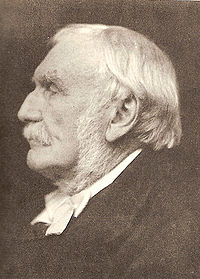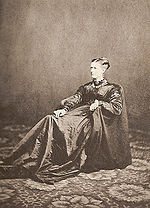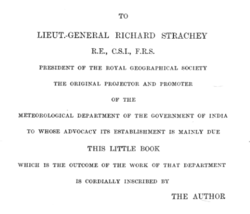
Richard Strachey
Encyclopedia


Sir Henry Strachey, 1st Baronet
Sir Henry Strachey, 1st Baronet was a British civil servant and politician.Strachey was the eldest son of Henry Strachey, of Sutton Court, Somerset, and his first wife Helen, daughter of Robert Clerk, a Scottish physician. His grandfather was the geologist John Strachey and his great-grandfather...
was born on 24 July 1817, at Sutton Court
Sutton Court
Sutton Court, Stowey, also known as Stowey Court, is a large English house built on the site of a fourteenth century castle, with sections built in the fifteenth and sixteenth century....
, Stowey
Stowey
Stowey is a small village within the Chew Valley in Somerset, England. It lies south of Chew Valley Lake and north of the Mendip Hills, approximately south of Bristol on the A368 road Weston-super-Mare to Bath...
, Somerset
Somerset
The ceremonial and non-metropolitan county of Somerset in South West England borders Bristol and Gloucestershire to the north, Wiltshire to the east, Dorset to the south-east, and Devon to the south-west. It is partly bounded to the north and west by the Bristol Channel and the estuary of the...
. From Addiscombe Military Academy
Addiscombe Military Academy
The East India Company Military Seminary, colloquially known as Addiscombe Seminary, Addiscombe College, or Addiscombe Military Academy was a British military academy at Addiscombe, Surrey, in what is now the London Borough of Croydon. It was established in 1809, and closed in 1861...
he passed into the Bengal Engineers in 1836, and was employed for some years on irrigation
Irrigation
Irrigation may be defined as the science of artificial application of water to the land or soil. It is used to assist in the growing of agricultural crops, maintenance of landscapes, and revegetation of disturbed soils in dry areas and during periods of inadequate rainfall...
works in the Northwestern Provinces. Many members of the family were in the Indian government that sarcastic mentions were made of the "Government of the Stracheys".
Strachey served in the First Anglo-Sikh War
First Anglo-Sikh War
The First Anglo-Sikh War was fought between the Sikh Empire and the British East India Company between 1845 and 1846. It resulted in partial subjugation of the Sikh kingdom.-Background and causes of the war:...
of 1845–46, and was at the battles of Aliwal
Battle of Aliwal
The Battle of Aliwal was fought on 28 January 1846 between the British and the Sikhs. The British were led by Sir Harry Smith, while the Sikhs were led by Ranjodh Singh Majithia...
and Sobraon
Battle of Sobraon
The Battle of Sobraon was fought on 10 February 1846, between the forces of the British East India Company and the Sikh Khalsa Army, the army of the Sikh Empire of the Punjab...
, was mentioned in dispatches, and received a brevet-majority. From 1858 to 1865 he was chiefly employed in the public works department, either as acting or permanent secretary to the government of India
India
India , officially the Republic of India , is a country in South Asia. It is the seventh-largest country by geographical area, the second-most populous country with over 1.2 billion people, and the most populous democracy in the world...
, and from 1867 to 1871 he filled the post of director-general of irrigation, then specially created.
During this period the entire administration of public works was reorganized to adapt it to the increasing magnitude of the interests with which this department has had to deal since its establishment by Lord Dalhousie
James Broun-Ramsay, 1st Marquess of Dalhousie
James Andrew Broun-Ramsay, 1st Marquess of Dalhousie KT, PC was a Scottish statesman, and a colonial administrator in British India....
in 1854. For this reorganization, under which the accounts were placed on a proper footing and the forest administration greatly developed, Strachey was chiefly responsible. His work in connection with Indian finance was important. In 1867 he prepared a scheme in considerable detail for decentralizing the financial administration of India, which formed the basis of the policy afterwards carried into effect by his brother Sir John Strachey under Lord Mayo
Richard Bourke, 6th Earl of Mayo
Richard Southwell Bourke, 6th Earl of Mayo KP, GMSI, PC , styled Lord Naas between 1842 and 1867, was a statesman and prominent member of the British Conservative Party from Dublin, Ireland....
and Lord Lytton
Robert Bulwer-Lytton, 1st Earl of Lytton
Edward Robert Lytton Bulwer-Lytton, 1st Earl of Lytton, GCB, GCSI, GCIE, PC was an English statesman and poet...
.
He left India in 1871, but in 1877 he was sent there to confer with the government on the purchase of the East Indian railway, and was then selected as president of the commission of inquiry into Indian famine
Famine
A famine is a widespread scarcity of food, caused by several factors including crop failure, overpopulation, or government policies. This phenomenon is usually accompanied or followed by regional malnutrition, starvation, epidemic, and increased mortality. Every continent in the world has...
s. In 1878 he was appointed to act for six months as financial member of the governor-general's council, when he made proposals for meeting the difficulties arising from the depreciation of the rupee
Rupee
The rupee is the common name for the monetary unit of account in India, Sri Lanka, Nepal, Pakistan, Mauritius, Seychelles, Maldives, and formerly in Burma, and Afghanistan. Historically, the first currency called "rupee" was introduced in the 16th century...
, then just beginning to be serious. These proposals did not meet with the support of the secretary of state. From that time he continued to take an active part in the efforts made to bring the currencies of India and England
England
England is a country that is part of the United Kingdom. It shares land borders with Scotland to the north and Wales to the west; the Irish Sea is to the north west, the Celtic Sea to the south west, with the North Sea to the east and the English Channel to the south separating it from continental...
into harmony, until in 1892 he was appointed a member of Lord Herschell
Farrer Herschell, 1st Baron Herschell
Farrer Herschell, 1st Baron Herschell GCB, PC, QC was Lord Chancellor of Great Britain in 1886, and again from 1892 to 1895.-Early career:...
's committee, which arrived at conclusions in accordance with the views put forward by him in 1878.
In 1892, Strachey attended the International Monetary Conference
International Monetary Conferences
The international monetary conferences were a series of assemblies held in the second half of the 19th century. They were held with a view to reaching agreement on matters relating to international banking...
at Brussels
Brussels
Brussels , officially the Brussels Region or Brussels-Capital Region , is the capital of Belgium and the de facto capital of the European Union...
as delegate for British India. He was a member of the council of the secretary of state for India from 1875 to 1889, when he resigned his seat in order to accept the post of chairman of the East Indian Railway Company
East Indian Railway Company
The East Indian Railway Company, later known as the East Indian Railway , introduced railways to eastern and northern India, while the Companies such as the Great Indian Peninsular Railway, South Indian Railway, Central India Railway and the North-Western Railway operated in other parts of India...
.

Geology
Geology is the science comprising the study of solid Earth, the rocks of which it is composed, and the processes by which it evolves. Geology gives insight into the history of the Earth, as it provides the primary evidence for plate tectonics, the evolutionary history of life, and past climates...
, botany
Botany
Botany, plant science, or plant biology is a branch of biology that involves the scientific study of plant life. Traditionally, botany also included the study of fungi, algae and viruses...
and physical geography of the Himalayas
Himalayas
The Himalaya Range or Himalaya Mountains Sanskrit: Devanagari: हिमालय, literally "abode of snow"), usually called the Himalayas or Himalaya for short, is a mountain range in Asia, separating the Indian subcontinent from the Tibetan Plateau...
were considerable. He devoted much time to meteorological
Meteorology
Meteorology is the interdisciplinary scientific study of the atmosphere. Studies in the field stretch back millennia, though significant progress in meteorology did not occur until the 18th century. The 19th century saw breakthroughs occur after observing networks developed across several countries...
research, was largely instrumental in the formation of the Indian meteorological department, and became chairman of the meteorological council of the Royal Society
Royal Society
The Royal Society of London for Improving Natural Knowledge, known simply as the Royal Society, is a learned society for science, and is possibly the oldest such society in existence. Founded in November 1660, it was granted a Royal Charter by King Charles II as the "Royal Society of London"...
in 1383. From 1888 to 1890 he was president of the Royal Geographical Society
Royal Geographical Society
The Royal Geographical Society is a British learned society founded in 1830 for the advancement of geographical sciences...
. In 1897 he was awarded one of the Royal Medal
Royal Medal
The Royal Medal, also known as The Queen's Medal, is a silver-gilt medal awarded each year by the Royal Society, two for "the most important contributions to the advancement of natural knowledge" and one for "distinguished contributions in the applied sciences" made within the Commonwealth of...
s of the Royal Society, of which he became a fellow in 1854; and in the same year he was created G.C.S.I.
Order of the Star of India
The Most Exalted Order of the Star of India is an order of chivalry founded by Queen Victoria in 1861. The Order includes members of three classes:# Knight Grand Commander # Knight Commander # Companion...
He died on 12 February 1908.
His first wife Caroline Bowles died in 1855, within a year of their marriage.
Jane, Lady Strachey (1840 - 1928), formerly Jane Maria Grant, who he married on 4 January 1859, was a well-known authoress and supporter of women's suffrage
Women's suffrage
Women's suffrage or woman suffrage is the right of women to vote and to run for office. The expression is also used for the economic and political reform movement aimed at extending these rights to women and without any restrictions or qualifications such as property ownership, payment of tax, or...
. She co-led the Mud March
Mud March (Suffragists)
The Mud March of 7 February 1907 was the first large procession organized by the National Union of Women's Suffrage Societies . Over 3,000 women trudged through the cold and the rutty streets of London from Hyde Park to Exeter Hall to advocate for women’s suffrage.Millicent Fawcett, the renowned...
of 1907 in London. She was born at sea off the Cape of Good Hope on 13 March 1840, and died on 14 December 1928.
Sir Richard and Lady Strachey were the parents of thirteen children of whom ten survived to adulthood, among them the authors Lytton Strachey
Lytton Strachey
Giles Lytton Strachey was a British writer and critic. He is best known for establishing a new form of biography in which psychological insight and sympathy are combined with irreverence and wit...
, James Strachey
James Strachey
James Beaumont Strachey was a British psychoanalyst, and, with his wife Alix, a translator of Sigmund Freud into English...
, Oliver Strachey
Oliver Strachey
Oliver Strachey , a British civil servant in the Foreign Office was a cryptographer from World War I to World War II....
and Dorothy Bussy née Strachey
Dorothy Bussy
Dorothy Bussy was an English novelist and translator.-Family background and childhood:Dorothy Bussy was a member of the Strachey family, one of ten children of Jane Strachey and the great British Empire soldier and administrator Lt-Gen Sir Richard Strachey...
.
Other sources
- Sabyasachi Bhattacharya (2005) The Financial Foundations of the British Raj. Orient Longman. ISBN 8125029036.
- Barbara Caine (2005) Bombay to Bloomsbury: A Biography of the Strachey Family. Oxford University PressOxford University PressOxford University Press is the largest university press in the world. It is a department of the University of Oxford and is governed by a group of 15 academics appointed by the Vice-Chancellor known as the Delegates of the Press. They are headed by the Secretary to the Delegates, who serves as...
. ISBN 0199250340.

